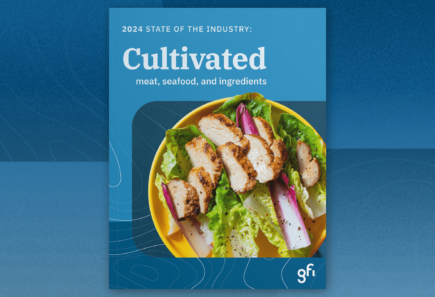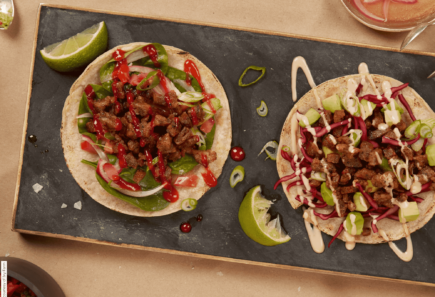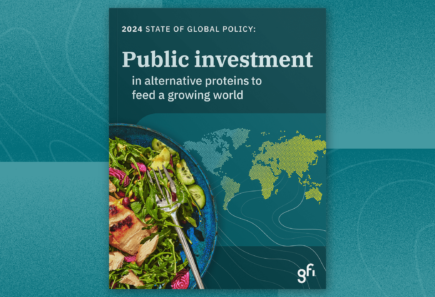
Cultivated meat media kit
Cultivated meat stands to transform our global food system. Learn the basics and dig into the latest updates on this game-changing protein alternative.

Jump to the latest news
The basics
Cultivated meat offers the game-changing potential to make meat in a healthier, safer, and more sustainable way. Cultivated meat looks, cooks, and tastes the same as the beef, pork, chicken, and fish we eat today, but grown directly from animal cells, without the need for antibiotics, hormones, and steroids.
By producing meat this way, we can satisfy the growing global demand for protein while reducing pressure on our planet and enhancing food security. When produced at scale using renewable energy, cultivated meat is projected to generate a fraction of the emissions and require much less land and water compared to conventional meat production.
Nomenclature consensus
Following multiple consumer studies and corporate surveys, industry consensus has landed on “cultivated” as the preferred term for meat produced directly from animal cells.

The latest research conducted by Embold Research (2022) and commissioned by GFI demonstrates consumer preferences for using “cultivated meat” over other terms such as “cultured,” “lab-grown,” and “cell-based.” These findings mirror the results of two other studies: a 2019 GFI-commissioned Mattson study, and a 2020 Rutgers seafood study commissioned by BlueNalu. Both studies found “cultivated” to be consumers’ preferred term.
Globally, cultivated meat companies and key industry stakeholders have aligned on “cultivated.” In fact, 30 key industry stakeholders across Asia—from companies to regional coalition groups, and government initiatives—adopted “cultivated” as the preferred English-language descriptor for all food products grown directly from animal cells.
Globally, cultivated meat companies and key industry stakeholders have aligned on “cultivated.” Just last month, 30 key industry stakeholders across Asia—from companies to regional coalition groups, and government initiatives—adopted “cultivated” as the preferred English-language descriptor for all food products grown directly from animal cells.

Global challenges require scalable solutions
If the world is to achieve its climate, global health, food security, and biodiversity goals, diversifying how meat is made will be as essential as the global transition to renewable energy. This is why we need alternative proteins.
Major breakthroughs for cultivated meat

In 2022, the U.S. Food and Drug Administration (USDA) became the second regulatory agency worldwide to greenlight a cultivated meat product, setting out a clear path to market in the United States for cultivated meat companies under a transparent regulatory process. This historic news follows the Singapore Food Agency’s world-first approval of a cultivated meat product in late 2020.
In 2023, two American companies – UPSIDE Foods and GOOD Meat – received landmark grants of inspection from the U.S. Department of Agriculture (USDA), allowing them to sell their cultivated chicken products in the United States. This regulatory breakthrough means Americans are closer to purchasing cultivated meat than ever.


In November 2024, building on its successful Singapore debut, Australian startup Vow briefly debuted its Japanese quail product in Hong Kong, making it the first company to sell cultivated meat in China. Vow received its initial regulatory approval in March 2024 to sell its product in Singapore.
Earlier in 2024, Israel’s Ministry of Health (MoH) issued a pre-market approval for Aleph Cuts, the world’s first cultivated beef steaks, in a “No Questions” letter. This green light is the first ever for non-chicken cultivated meat anywhere in the world and the first for cultivated meat of any kind in the Middle East. As of April 2025, additional regulatory steps remain (inspection and labeling) before this product can be sold in Israel.
Also in 2024, Singapore lined its grocery shelves with a hybrid cultivated chicken product from GOOD MEAT containing 3% cultivated meat and 97% plant-based ingredients. Available as a frozen retail product to home cooks in Singapore, the new hybrid chicken product is a solid step toward scaling the emerging cultivated meat industry. By dramatically reducing per-piece costs through hybrid formulations, cultivated meat companies can sell to a larger share of the population while they work to scale up manufacturing volumes.
In 2025, Mission Barns became the first company in the world to receive regulatory clearance for cultivated pork fat from the U.S. Food and Drug Administration (FDA) and the third company to receive a regulatory green light in the United States for cultivated meat. Upon obtaining a U.S. Department of Agriculture (USDA) grant of inspection for their production facility, and label approval from USDA, Mission Barns plans to launch meatball and bacon products, made from a combination of plant-based proteins and small amounts of their cultivated pork fat, at select restaurant and retail locations. Also in 2025, Vow’s cultivated quail completed an initial Food Standards Australia New Zealand (FSANZ) safety review and is pending final approval from the Australia and New Zealand Food Regulation Ministerial Council.
Cultivated meat FAQs
Read responses to some of the most frequently asked questions about cultivated meat.
What is cultivated meat?
Cultivated meat is essentially the same as the beef, pork, chicken, and fish we eat today but grown directly from animal cells, without the need for antibiotics, hormones, and steroids. It also has the potential to improve meat’s nutritional profile, such as its saturated fat, cholesterol, and vitamin content.
Cultivated meat has the potential to generate a fraction of the emissions and require far less land and water compared to conventional meat production. When produced at scale using renewable energy, cultivated meat can cut emissions by 92%, and use up to 95% less land and 78% less water than conventional beef.
How does cultivated meat compare?
- On taste: Cultivated meat can give consumers the same experience as conventional meat in terms of taste, smell, texture, and consistency. Grown in a controlled environment with less opportunity for contamination, this production method shows potential to produce fresher, safer, and more desirable cuts of meat.
- On health: In facilities similar to breweries, cultivated meat is fed basic nutrients such as amino acids, vitamins, and other proteins. Just as with animal meat, the composition of cultivated meat depends on the conditions in which it grows and what it’s fed. Unlike conventional animal products, cultivated meat is made without the need for antibiotics, hormones, or steroids, and has the potential to improve meat’s nutritional profile, such as its saturated fat, cholesterol, and vitamin content.
- On the planet: Cultivating meat is more efficient than conventional meat production. When produced at a commercial scale using renewable energy, meat made in this way could produce up to 92% less emissions, and use up to 95% less land and 78% less water when compared to conventional beef production.
Is cultivated meat safe?
In the United States, the Food and Drug Administration is responsible for ensuring the safety of foods available in the U.S. market and, together with the USDA, will regulate the sale of cultivated meat.
Each cultivated meat product will be assessed by the FDA as part of a rigorous pre-market safety review. Cultivated meat companies must then follow the same processes that conventional meat companies must follow to ensure safe production and handling.
The clean and controlled environment in which cultivated meat is produced, akin to modern breweries, offers numerous advantages for product safety, including the reduced risk of contaminants and foodborne pathogens.
Can cultivated meat improve public health?
Conventional meat requires ingredients that cultivated meat does not: antibiotics, steroids, and other additives. This means that, unlike our current methods of meat production, cultivated meat will not contribute to antibiotic resistance. Read about the global health benefits of alternative proteins and this Nature Food article for more on cultivated meat and antibiotics.
According to the CDC, three out of four new or emerging infectious diseases in humans come from animals. Cultivated meat is produced in facilities with cleaner conditions than conventional meat processing facilities. This reduces the risk of both foodborne illnesses and zoonotic diseases.

Cultivated meat visual library
Our cultivated meat image library presents an ever-increasing selection of cultivated meat images available for use under Creative Commons licenses. Check out photos from Avant Meats, New Age Meats, Shiok Meats, Wild Type, BlueNalu, and more!
Industry resources
Read these related resources to learn more about the burgeoning field of cultivated meat.
Words of support
From high-level government reports and directives to statements from leaders in industry and business, cultivated meat has been recognized as a powerful solution for creating a more resilient food system.


The order acknowledged the promise of “cultivating alternative food sources” and “looking to improve food security and drive agricultural innovation through new technologies…[including] foods made with cultured animal cells.”

“We’ve got new technology with stem cell protein growth there. While some people may be anxious about taking their markets, shouldn’t we in the United States be about how we can grow and feed people more efficiently and more effectively … these techniques need to be embraced, not kept out of.”
The UN Environment Programme’s Frontiers Report
This special issue of the Frontiers Report focuses on the potential environmental, health, social, and animal welfare implications of the uptake of novel meat and dairy alternatives, in particular novel plant-based, fermentation-derived, and cultivated products.
“Novel plant-based meat, cultivated meat and fermentation-derived foods show potential for reduced environmental impacts compared to many conventional ASF. They also show promise for reduced risk of zoonoses and antimicrobial resistance, and can significantly reduce animal welfare concerns associated with conventional animal agriculture.”

The Center for Strategic and International Studies’ Mitigating Risk and Capturing Opportunity Report
The Center for Strategic and International Studies released this report in May 2023 detailing ways alternative protein can solve for growing demand for food, the environmental strain of mass food production, and pandemic emergence.
“With the need to de-risk global food systems growing increasingly serious, many high-income and import-reliant economies are investing in alternative proteins as a means to establish a more sustainable and efficient domestic protein production. While the climate change benefits of alternative proteins have been fairly well documented to this point, relatively less is known about the ability of alternative proteins to allay risks inherent to today’s food systems. These include global risks associated with pandemic preparedness and disease prevention, as well as national security risks related to economic competitiveness and biosecurity across future agricultural markets.”

The Intergovernmental Panel on Climate Change’s (IPCC) Sixth Assessment Report
The IPCC’s Sixth Assessment Report released in April, 2022, where the world’s top scientists name cultivated meat and other alternative proteins as transformative solutions which can play a critical role in halving global emissions by 2030. It states:
- Emerging food technologies such as precision fermentation, cultivated meat, and plant-based foods can “promise substantial reductions in direct greenhouse gas emissions from food production” (TS. 5.6.2).
- Citing a paper co-authored by GFI Israel senior scientist Tom Ben-Arye, the report acknowledges that, while in its infancy and reliant on increased investments, innovation, and regulatory approval, cultivated meat offers a more sustainable alternative to current livestock production systems and agricultural land use (7.3.3).
- As well as reducing emissions, sustainable proteins like cultivated meat “lower land, water, and nutrient footprints, and address concerns over animal welfare” (TS. 5.6.2).

Breakthrough Energy’s Federal Climate Policy Playbook
This resource includes policy recommendations for cultivated meat and other alternative proteins as a critical component of reaching net-zero emissions. It states:
“The federal government should invest in robust R&D to further explore innovations such as (…) cellular agriculture, including stable cell lines, optimized cell culture media for growing meat, novel methods of scaffolding support for muscle and fat cell growth, and improved bioreactor designs.”

Cultivated meat in the news
Read coverage by the world’s leading media outlets, who have followed on as the field of cultivated meat has evolved and grown.
Are you working on a story?
Access our full selection of media resources, including reports, data, and insights from the world of alternative proteins.


Recent media statements
Check out our media statements on breaking cultivated meat news and other alternative protein developments.
The featured image showing cultivated chicken is courtesy of GOOD Meat

































